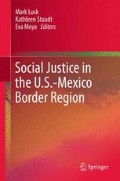Abstract
The chapter analyzes the challenges associated with public education on the Texas side of the border along with the opportunities that educators, parents, and constituents have seized to create better educational experiences for border students. Special focus is placed on one of Texas’ top-ten-sized urban school districts, in which nine of ten students are Hispanic, one of four English learners, and eight of ten economically disadvantaged. Despite the constraints of a state and federal system that locks all students—despite their complex heritages and diverse household incomes—into a one-way-fits-all educational structure and rigid standardized testing, community-oriented leaders, educators, and parents designed local policies to include bilingual programs, language magnet schools, service learning, and strategies to strengthen students’ pathways to higher education that enhance prospects for a prosperous border gateway region of the Americas.
Access this chapter
Tax calculation will be finalised at checkout
Purchases are for personal use only
References
Center for Public Policy Priorities [CPPP]. (2009). Kids living on the border more than twice as likely to live in poverty. Retrieved from http://www.cppp.org/files/KC/BKC_McAllen.ppt#270,12.
Cervera Gómez, L., Lizárraga Bustamante, G.,&Sánchez Guillen, C. (2008). Estudio georeferencial de la Evaluación Nacional de Logro Académico en Centros Escolares [ENLACE] en el municipio de Ciudad Juárez, Chihuahua: Análisis especial [Georeferenced study of the National Evaluation of Academic Achievement in School Centers [ENLACE] in the municipality of Ciudad Juárez, Chihuahua. Special analysis]. Revista Electrónica de Investigacióon Educativa [REDIE], 10(1). http://redie.uabc.mx/vol10no1/contenido-cervera.html.
College Board. (2009). College-Bound seniors are most diverse group ever to take SAT as more minority students prepare for higher education. Retrieved from http://press.collegeboard.org/releases/2009/2009-college-bound-seniors-are-most-diverse-group-ever-take-sat174-more-minority-students-pr.
Crawford, J. (2004). Educating English learners: Language diversity in the classroom (5th ed.). Los Angeles: Bilingual Education Services, Inc.
Cummins, J. (1979). Cognitive/academic language proficiency, linguistic interdependence, the optimum age question and some other matters. Working Papers on Bilingualism, 19, 121–129.
Cummins, J. (1984). Bilingualism and special education. Clevedon: Multilingual Matters.
Cummins, J. (2000). Language, power and pedagogy. Clevedon: Multilingual Matters.
Dow, P. (2008). Dual-language education: A longitudinal study of students’ achievement in an El Paso County, Texas school district. Unpublished doctoral dissertation, The University of Texas at El Paso.
Dow, P., Krashen, S.,&Tinajero, J. (2010, Winter). A longitudinal confirmation of the interdependence hypothesis. The International Journal of Foreign Language Teaching, 5(2): 2–3.
Hakuta, K., Butler, Y.,&Witt, D. (2000). How long does it take English learners to attain proficiency? (Policy Report). Berkley: The University of California Linguistic Minority Research Institute.
Hochschild, J.,&Scrovonik, N. (2003). The American dream and the public schools. New York: Oxford University Press.
Intercultural Development Research Association [IDRA]. (2010). Retrieved from www.idra.org.
Krashen, S. (2003). Three roles for reading for language-minority students. In G. Garcia (Ed.), English learners: Reaching the highest level of English proficiency (pp. 55–70). Newark: International Reading Association.
Krashen, S.,&McField, G. (2006). What works? Reviewing the latest evidence on bilingual education. Language Learner, 1(2), 7–10. 34.
McNeil, L. (2005). Faking equity: High-stakes testing and the education of Latino youth. In A. Valenzuela (Ed.), Leaving children behind: How ‘Texas-Style’ accountability fails Latino youth (pp. 57–112). Albany: State University of New York Press.
McNeil, L., Coppola, E., Radigan, J.,&Vazquez Heilig, J. (2008, January). Avoidable losses: High-stakes accountability and the drop-out crisis. Educational Policy Analysis Archives, 16(3). http://epaa.asu.edu/epaa.v16n3.
Rippberger, S.,&Staudt, K. (2003). Pledging allegiance: Learning nationalism in El Paso-Juárez. New York: Routledge/Falmer.
Rocha, G.,&Webking, R. (1993). Politics and public education: Edgewood v. Kirby and the reform of public school financing in Texas (2nd ed.). Minneapolis: West Publishing.
Romo, H.,&Falbo, T. (1996). Latino high school graduation. Austin: University of Texas Press.
Sharp, J. (1998). Bordering the future: Challenge and opportunity in the Texas border region. Austin: Texas Comptroller of Public Accounts.
Shirley, R. (1997). Community organizing and urban school reform. Austin: The University of Texas Press.
Southern Education Foundation [SEF]. (2010). The worst of times: Children in extreme poverty in the south and nation. Retrieved from http://www.southerneducation.org/pdf/TWOT-Extreme%20Child%20Poverty%20Rpt-Final.pdf.
Staudt, K. (2010). Texas accountability tests: Standardizing disengagement for Latino students? In D. Leal&K. Meier (Eds.), Politics of Latino education (pp. 43–57). New York: Teachers College Press/Columbia University.
Staudt, K.,&Méndez, Z. (2010). Schooling for global competitiveness in the border metropolitan region. In K. Staudt, C. Fuentes,&C. Monárrez Fragoso (Eds.), Cities and citizenship at the U.S.-Mexico border: The Paso del Norte metropolitan region (pp. 173–194). New York: Palgrave.
Texas Association of School Boards [TASB]. (2008). A cost analysis for Texas public schools. Retrieved from http://www.tasb.org/legislative/legislative/reports/documents/costanalysis09.pdf. Accessed 30 Dec 2010.
Texas Education Agency [TEA]. (2011a). Academic excellence indicator system. Retrieved January 15, 2011, from www.tea.state.tx.us/aeis.
Texas Education Agency [TEA]. (2011b, April 22). State of Texas Assessments of Academic Readiness (STAAR TM ) resources. Retrieved from http://www.tea.state.tx.us/student.assessment/.staar/.
Thomas, W.,&Collier, V. (2002). A national study of school effectiveness for language minority students’ long-term academic achievement. Santa Cruz/Washington, DC: Center for Research on Education, Diversity&Excellence.
U.S. Commission on Civil Rights. (1969–1974). Mexican American Education Study [MAES]. Vols. 1–6. Washington, DC.
Valenzuela, A. (1999). Subtractive schooling: U.S.-Mexican youth and the politics of caring. Albany: State University of New York at Albany Press.
Valenzuela, A. (2005). Leaving children behind: How ‘Texas-Style’ accountability fails Latino youth. Albany: State University of New York Press.
Ysleta Independent School District [YISD]. (2010a). YISD Datamart,password protected – Dow access. Retrieved from https://datamart.yisd.net/.
Ysleta Independent School District [YISD]. (2010b). YISD statistics. Retrieved from http://www2.yisd.net/education/components/scrapbook/default.php?sectiondetailid=26&.
Author information
Authors and Affiliations
Corresponding author
Editor information
Editors and Affiliations
Rights and permissions
Copyright information
© 2012 Springer Science+Business Media B.V.
About this chapter
Cite this chapter
Dow, P., Staudt, K. (2012). Education Policies: Standardized Testing, English-Language Learners, and Border Futures. In: Lusk, M., Staudt, K., Moya, E. (eds) Social Justice in the U.S.-Mexico Border Region. Springer, Dordrecht. https://doi.org/10.1007/978-94-007-4150-8_12
Download citation
DOI: https://doi.org/10.1007/978-94-007-4150-8_12
Published:
Publisher Name: Springer, Dordrecht
Print ISBN: 978-94-007-4149-2
Online ISBN: 978-94-007-4150-8
eBook Packages: Humanities, Social Sciences and LawSocial Sciences (R0)

